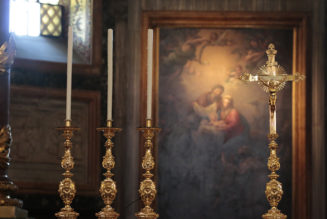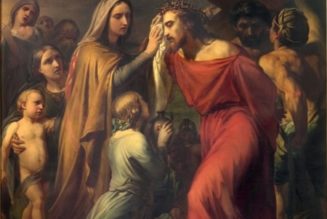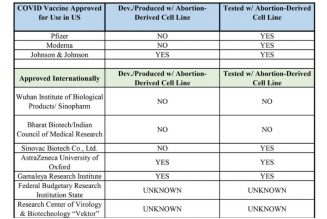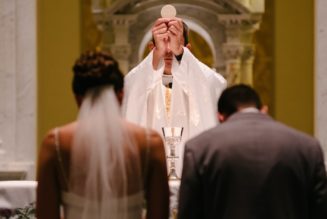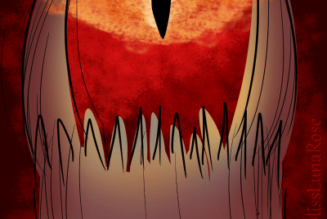By Fr. Jerry Pokorsky ( bio – articles – email ) | May 22, 2023
Jesus draws all of us to Himself through the Cross and Resurrection. He returns to the Father in His glorious Ascension and brings our humanity with Him. He completes His sacred mission of the Word as prophesized by Isaiah (cf. Is. 55:11). Heaven is the destiny of those who follow Him. We believe in heaven (but without daring to judge any soul) we also believe in hell for those who live evil lives and reject the commandments of Jesus.
According to estimates, the world population is 8 billion. Christians represent 2.2 billion, with Catholics making up half of that. The various factions of Islam have nearly 1.6 billion believers. The Hindus have just over 1 billion, Buddhists ½ billion, those with no religious affiliation 1.1 billion, and many other religions—including Judaism, have less than 100 million adherents. Some suggest that 7% of the world’s population is atheist.
But admit it or not, we are all religious believers.
Let’s survey (in a non-academic way) various beliefs in the afterlife. Some components are compatible with Catholic teaching; others are not.
In Islam, heaven is the final abode of the righteous. “Believers” will enjoy pleasure in heaven (Jannah), while the unbelievers (Kafir) will suffer in hell (Jahannam). Afterlife experiences are physical, psychic, and spiritual. Heaven includes pleasures such as gardens with lush branches, flowing springs, every type of fruit, beautiful furnishings, elegant rubies, gushing springs, maidens with gorgeous eyes (sorry, ladies), and so on. For unbelievers, excruciating pain and horror in hell are on a scale to match the delights of heaven.
Buddhism holds we undergo reincarnation time after time until we get our life right. There are several strains of Buddhism, including various cycles of reincarnation. After many tries, the afterlife reflects a person’s “karma.” If a person has performed proper actions based on generosity, loving-kindness, compassion, and wisdom—his rebirth is in one or more heavenly realms. It is important to adopt a positive attitude and avoid negative ideas. The deceased get help from different Buddhas who show them the path to the bright light. If a person has committed harmful actions by body, speech, and mind based on greed, hate, and delusion, rebirth as an animal or a hungry ghost occurs in a lower realm.
Most Hindus believe in a cycle of life, death, and rebirth. When a person dies, we are reborn in a different body. Hindus believe in karma. Good or bad actions in life lead to positive or negative merit and determine our status at the time of rebirth. Some Hindus believe that humans may be reborn in animal form and that rebirth from human to animal form only occurs if we repeatedly fail to learn lessons in human form. If we live life according to the teachings of the Hindu scriptures, we will be absorbed with Brahman, from where we originated. Brahman is the birthplace of all reality.
The Eastern religions have distinct gnostic tendencies that undermine the integral unity of body and soul. (The Western atheistic culture borrowed the dualistic understanding of the human person for ideological purposes such as the LGBTQ agenda.)
The Catholic view of the afterlife
Heaven is the place and condition of perfect supernatural happiness. In heaven, we see God face-to-face and know and enjoy the love of all creatures. Until the resurrection of the dead at the end of time, except for Jesus and his Mother, only the souls of the just are in heaven. After the resurrection of the body, the just will be in heaven, body, and soul. The depth of beatitude will depend on the measure of God’s grace with which a person dies based on merits earned during life on earth. Heaven is eternal and continuous. Heaven is communal because we share happiness with the angels and the saints.
Hell is a place of darkness, torment, and anguish. Jesus speaks of the everlasting fires of hell, prepared for the devil and his followers. Justice demands that there should be a hell. The wicked often prosper and may escape punishment in this world but not in the next. The thought of hell is chilling. The damned howl and gnash their teeth from sheer agony, loneliness, and despair. Hell is the loss of God. Damnation is the eternal “second death” described in Revelation. God respects human freedom, and those who are lost condemn themselves by their resistance to the grace of God. But the fact of hell does not—or should not—numb the energies or extinguish the spirit of a believer.
Atheists are also believers. They observe we are born, strive to live happy lives, and die. They believe we return to nothingness. Atheists often insist they always follow empirical science and reject religious faith. Catholics also follow science as we study the handiwork of God. Religion and science are distinct but without contradiction. Atheists are secular and religious believers.
It is impossible for a scientist—a software specialist or anyone—to rely entirely on his empirical studies. He must believe in others and accept their work. Atheists rightly believe in the integrity of expert testimony and the results of their studies. But practical atheists resist many moral restraints on scientific studies (e.g., using aborted baby tissue for medical research).
Catholics share in the atheistic vision up to a point: we are born, we strive to live a happy life, and we die. Like all believers, atheists suffer deprivation and pain in this life. Hence, the last comfort of the atheist is the return to nothingness upon death. The atheist has no empirical evidence for this hope. He can only believe in absolute obliteration. For an atheist, returning to nothingness at death is an infallible dogma of the atheistic religion.
Catholic teaching is a remedy for the inherent inconsistencies of world religions, including the cult of atheism. The Ascension reinforces the integrity of body and soul, faith and reason, religion and science—and directs us on the path to heavenly glory and resurrection of the body.
Sound Off! CatholicCulture.org supporters weigh in.
All comments are moderated. To lighten our editing burden, only current donors are allowed to Sound Off. If you are a current donor, log in to see the comment form; otherwise please support our work, and Sound Off!

There are no comments yet for this item.



